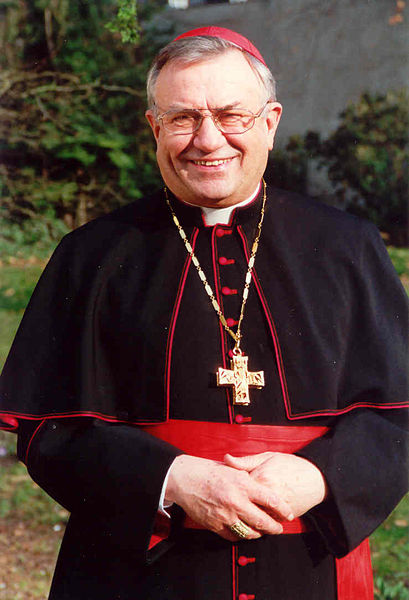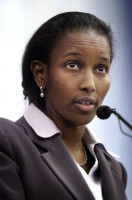Ein Jahr nach dem ersten Brief der 38 muslimischen Gelehrten an den papst – eine Antwort auf seine Regensburger Rede – hat sich eine noch viel breitere Gruppe von islamischen Gelehrten und Würdenträgern zusammengefunden, um einen zweiten Brief an die Christenheit zu schreiben.
Es handelt sich um einen Appell, in den Geboten der Gottes- und Nächstenliebe das Vereinende der 3 großen abrahamitischen Religionen zu erkennen.
Die Gelehrten ergehen sich in ausführlichen Textvergleichen zwischen hebräischer Bibel, NT und Koran und stellen die Gemeinsamkeiten heraus. Das ist ein präzedenzloser Vorgang: Die Provokation des Papstes hat einen echten Dialog in Gang gesetzt. Die islamischen Gelehrten haben noch nie so geschlossen und noch nie so detailliert über die konkurrierenden Monotheismen gesprochen. Es bewegt sich etwa.
Den gesamten Text, der morgen veröffentlich wird, dokumentiere ich im folgenden. Sämtliche Anmerkungen und die eindrucksvolle Liste der Unterzeichner finden sich hier. In der nächsten ZEIT folgt eine Deutung dieses Ereignisses.
In the Name of God, the Compassionate, the Merciful
On the Occasion of the Eid al-Fitr al-Mubarak 1428 A.H. / October 13th 2007 C.E., and on the One Year Anniversary of the Open Letter of 38 Muslim Scholars to H.H. Pope Benedict XVI,
An Open Letter and Call from Muslim Religious Leaders to:
His Holiness Pope Benedict XVI,
His All-Holiness Bartholomew I, Patriarch of Constantinople, New Rome, His Beatitude Theodoros II, Pope and Patriarch of Alexandria and All Africa, His Beatitude Ignatius IV, Patriarch of Antioch and All the East,
His Beatitude Theophilos III, Patriarch of the Holy City of Jerusalem, His Beatitude Alexy II, Patriarch of Moscow and All Russia,
His Beatitude Pavle, Patriarch of Belgrade and Serbia,His Beatitude Daniel, Patriarch of Romania, His Beatitude Maxim, Patriarch of Bulgaria,
His Beatitude Ilia II, Archbishop of Mtskheta-Tbilisi, Catholicos-Patriarch of All Georgia, His Beatitude Chrisostomos, Archbishop of Cyprus,
His Beatitude Christodoulos, Archbishop of Athens and All Greece, His Beatitude Sawa, Metropolitan of Warsaw and All Poland,
His Beatitude Anastasios, Archbishop of Tirana, Duerres and All Albania, His Beatitude Christoforos, Metropolitan of the Czech and Slovak Republics,
His Holiness Pope Shenouda III, Pope of Alexandria and Patriarch of All Africa on the Apostolic Throne of St. Mark,
His Beatitude Karekin II, Supreme Patriarch and Catholicos of All Armenians,
His Beatitude Ignatius Zakka I, Patriarch of Antioch and All the East, Supreme Head of the Universal Syrian Orthodox Church,
His Holiness Mar Thoma Didymos I, Catholicos of the East on the Apostolic Throne of St. Thomas and the Malankara Metropolitan,
His Holiness Abune Paulos, Fifth Patriarch and Catholicos of Ethiopia, Echege of the See of St. Tekle Haymanot, Archbishop of Axium,
His Beatitude Mar Dinkha IV, Patriarch of the Holy Apostolic Catholic Assyrian Church of the East,
The Most Rev. Rowan Williams, Archbishop of Canterbury,
Rev. Mark S. Hanson, Presiding Bishop of the Evangelical Lutheran Church in America, and President of the Lutheran World Federation,
Rev. George H. Freeman, General Secretary, World Methodist Council, Rev. David Coffey, President of the Baptist World Alliance,
Rev. Setri Nyomi, General Secretary of the World Alliance of Reformed Churches,
Rev. Dr. Samuel Kobia, General Secretary, World Council of Churches, And Leaders of Christian Churches, everywhere….
In the Name of God, the Compassionate, the Merciful
A Common Word between Us and You
(Summary and Abridgement)
Muslims and Christians together make up well over half of the world’s population. Without peace and justice between these two religious communities, there can be no meaningful peace in the world. The future of the world depends on peace between Muslims and Christians.
The basis for this peace and understanding already exists. It is part of the very foundational principles of both faiths: love of the One God, and love of the neighbour. These principles are found over and over again in the sacred texts of Islam and Christianity. The Unity of God, the necessity of love for Him, and the necessity of love of the neighbour is thus the common ground between Islam and Christianity. The following are only a few examples:
Of God’s Unity, God says in the Holy Qur’an: Say: He is God, the One! / God, the Self- Sufficient Besought of all! (Al-Ikhlas, 112:1-2). Of the necessity of love for God, God says in the Holy Qur’an: So invoke the Name of thy Lord and devote thyself to Him with a complete devotion (Al-Muzzammil, 73:8). Of the necessity of love for the neighbour, the Prophet Muhammad said: “None of you has faith until you love for your neighbour what you love for yourself.”
In the New Testament, Jesus Christ said: ‘Hear, O Israel, the Lord our God, the Lord is One. / And you shall love the Lord your God with all your heart, with all your soul, with all your mind, and with all your strength.’ This is the first commandment. / And the second, like it, is this: ‘You shall love your neighbour as yourself.’ There is no other commandment greater than these.” (Mark 12:29-31)
In the Holy Qur’an, God Most High enjoins Muslims to issue the following call to Christians (and Jews—the People of the Scripture):
Say: O People of the Scripture! Come to a common word between us and you: that we shall worship none but God, and that we shall ascribe no partner unto Him, and that none of us shall take others for lords beside God. And if they turn away, then say: Bear witness that we are they who have surrendered (unto Him). (Aal ‘Imran 3:64)
The words: we shall ascribe no partner unto Him relate to the Unity of God, and the words: worship none but God, relate to being totally devoted to God. Hence they all relate to the First and Greatest Commandment. According to one of the oldest and most authoritative commentaries on the Holy Qur’an the words: that none of us shall take others for lords beside God, mean ‘that none of us should obey the other in disobedience to what God has commanded’. This relates to the Second Commandment because justice and freedom of religion are a crucial part of love of the neighbour.
Thus in obedience to the Holy Qur’an, we as Muslims invite Christians to come together with us on the basis of what is common to us, which is also what is most essential to our faith and practice: the Two Commandments of love.
Weiter„Muslimische Gelehrte appellieren an die Kirche: Gottes- und Nächstenliebe vereinen uns“




